Top 10 Saudi Arabia Culture, Customs, and Etiquette
Saudi Arabian culture has evolved greatly over the years, with influences from Islamic heritage, Bedouin traditions, and numerous tribes involved in the old ... read more...trade. Everything about Saudi Arabia, from its history and architecture to its arts and daily life, reflects the liveliness of its culture. Saudi Arabia is also well-known for its people, who are deeply religious, traditional, and family-oriented. Let's take a look at the list of Saudi Arabia culture, customs, and etiquette.
-
When meeting and greeting in Saudi Arabia, close male counterparts shake hands and kiss on each cheek. A handshake between members of the same sex is acceptable when meeting in a more formal setting. Always use your right hand when shaking hands because the left hand is considered unclean. Everyone in the room will be greeted individually, and you should do the same.
Saudis will often stand closer to one another than many westerners are accustomed to, and members of the same sex will frequently touch arms when postulating or emphasizing a point. You should not be afraid to do so because it would be considered impolite and dismissive. Due to the conservative nature of Saudi Arabian society, men and women do not greet each other in public.
When greeting a Saudi, it is customary to use any honorific title followed by their first given name, such as Dr. Abdul. If you're ever in doubt about how to address someone, simply follow someone else's lead or politely ask your counterpart how they prefer to be addressed!
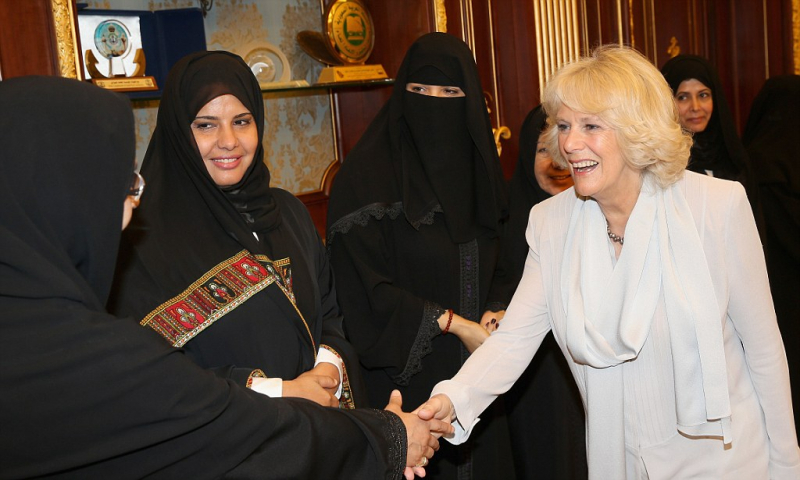
etiquipedia.blogspot.com 
realwealthbusiness.com -
Dinner etiquette in Saudi Arabia, like food, reflects the country's culture and tradition. Men and women are not permitted to eat dinner and other meals together. Women are only permitted to eat with their children, husbands, and siblings.
In general, eating Saudi food does not necessitate the use of utensils. People scoop with their right hand and fingers. In accordance with Islamic custom, serve and pass any food or dish with the right hand. The left hand is unclean and should not come into direct contact with food.
If you are eating at home, you may eat at floor level, in which case you should sit cross-legged or kneel on one knee. You should make an effort to try everything on the table and compliment the host. Dinner is the last meal of the day in Saudi Arabia. In Saudi Arabia, dinner is usually similar to lunch. Saudis typically eat their dinners late at night. Dinner is usually served between 10 p.m. and midnight.
Alcohol is forbidden under Islamic law, so many Saudis will not consume it. Some hotels that cater to Westerners will serve alcoholic beverages. While your Saudi hosts may not object to you drinking, it would be wiser to either drink very moderately or abstain entirely in their presence. Getting drunk and acting strangely will be considered completely inappropriate, rude, and offensive, and may result in harsh punishment.
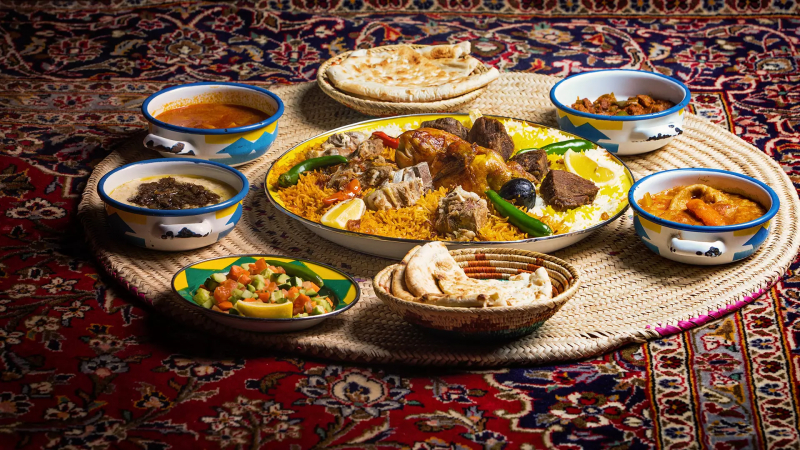
timeslifestyle.net 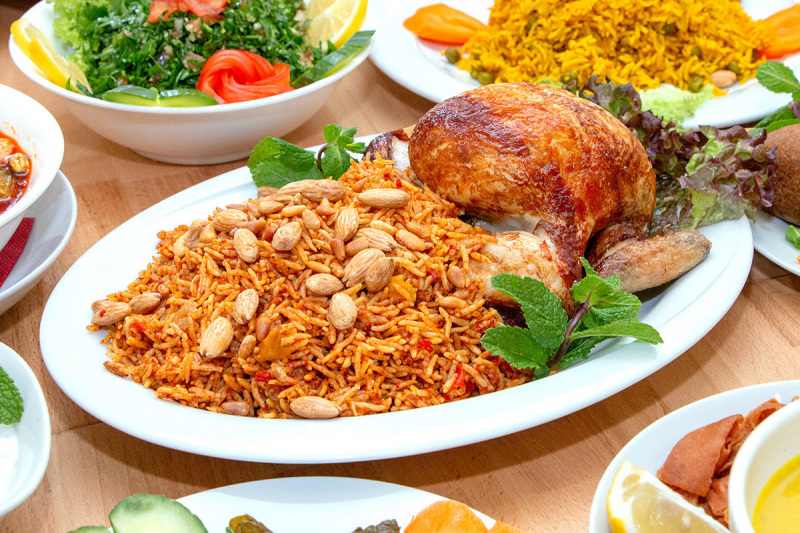
travel.earth -
In Saudi Arabian culture, hospitality is highly valued. Saudis will generally go out of their way to make their visitors feel welcome. Saudis can extend invitations to their homes multiple times and early in a friendship. Acceptance is a sign of goodwill. It is inappropriate to invite someone of the opposite gender to one's home for a private visit without a companion.
Unaccompanied men should avoid visiting another Saudi man's home without first informing the family, in case they inadvertently intrude on the women of the house. If a Saudi Arabian wishes to invite an entire family to their home, the male head of the family will usually extend the invitation to the eldest male of the other family.
Men give women notice before entering a room where unrelated women are socializing so that they have time to cover up. For example, if a sister's female friends come to visit, her brother will say "Ya allah!" before entering the room. Male visitors are typically served by the youngest son or a male domestic worker, while female visitors are served by the youngest daughter or a female maid. When you arrive, you will be offered Arabic coffee and dates. A 'finjan' is a type of coffee cup (small cup).
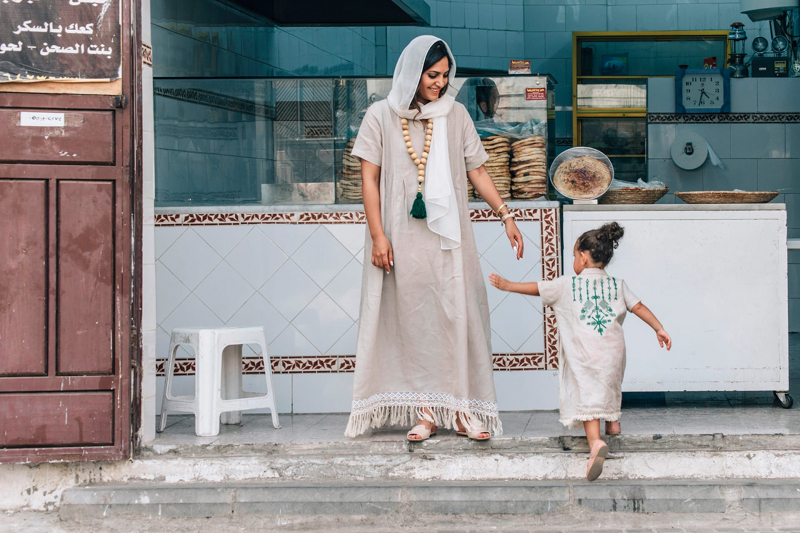
visitsaudi.com 
furniture-magazine.com -
Gift-giving is a personal and widespread practice throughout Saudi Arabia. Personal gifts, on the other hand, are typically given only by close friends. If you are invited to a Saudi family's home, it is customary to bring a small gift as a thank you (e.g. food items). This should be given as a gesture to the entire family rather than to a specific member. It is considered especially impolite for men to give individual women gifts, especially those with romantic overtones (e.g. flowers).
Avoid giving expensive or extravagant gifts. This can embarrass the recipient, especially if given in public. When a gift is given, it is unlikely that it will be opened in front of the giver. Unless the object is too heavy and both hands are required, give and pass gifts with the right hand. Saudis may thoroughly examine a gift upon receipt, remarking on it in admiration to demonstrate their appreciation and respect for the giver's choice.
Do not give alcohol, pork, knives, pigskin, alcoholic perfumes, or anything with a sexualized image of a woman. Perfumes, watches, and 'Oud' (a type of incense or oil used daily by Saudis) are popular and appropriate personal gifts for men.
Unless they are a very close relative, men should not buy perfume or Oud for a woman. Women may purchase Oud for one another. Avoid purchasing gold or silk clothing for Saudi men. Wearing these materials is prohibited by Islamic law. Silver is the best color and material to buy for men. Even if they are only going away for the weekend, Saudis almost always bring gifts for friends and family.

middleeasteye.com 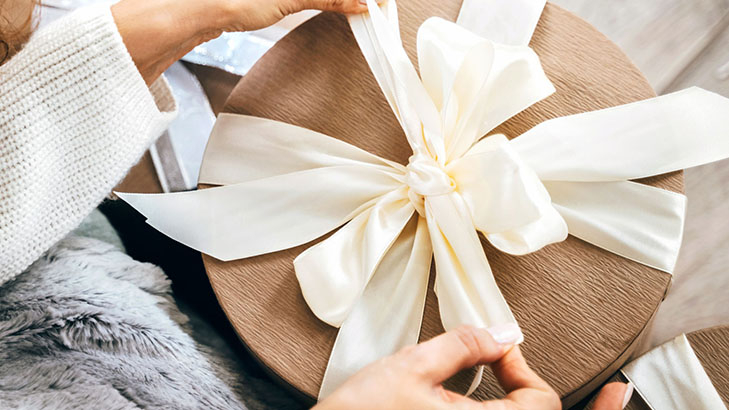
trolymuasam.com -
Saudis generally prefer traditional clothing to Western clothing. The traditional clothing is loose and breathable, which is not only comfortable in the country's hot climate, but also adheres to the Islamic ideal of modesty.
Saudi women usually wear a black abaya over their dresses. Abayas are available in a variety of contemporary and traditional styles. They usually wear Shaylas around their necks. A Shayla is a black, gauzy scarf that wraps around one's head and is secured with jewelry, circlets, or hats. Sequins, brightly colored fabric appliqués, or coins are frequently used to adorn their traditional gowns. Some Saudi women are also seen wearing a sheer veil, which serves as a symbol of virtue and modesty as well as protecting them from the harsh sunlight.
Saudi men typically wear a thobe, which is a traditional dress. This is a long, ankle-length, flowing robe-type garment made of white or light-colored cotton in warm weather and darker-colored wool in cold weather. Regardless of occupation or social standing, nearly all Saudi men wear thobes. For formal occasions, such as weddings, men wear a bisht or mislah over their thobe. These are long cloaks with gold trim that come in white, brown, or black.
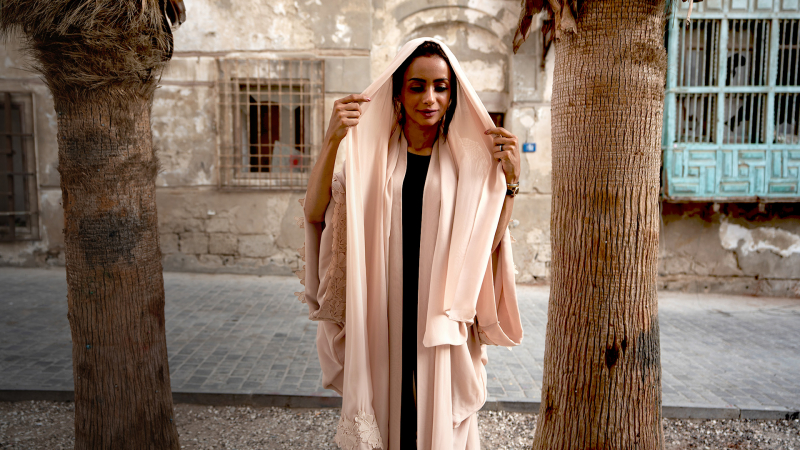
visitsaudi.com 
thetimes.co.uk -
Marriages are typically arranged, but an increasing number of young men and women in urban areas are given the opportunity to choose their partners. In Saudi Arabia, "dating" generally entails getting to know someone with the goal of marrying them. Men and women rarely display open affection in public, and many couples may not be allowed to see each other alone. As a result, Saudi couples typically meet in public places that are neutral or online. Cell phones and the internet have enabled young people to interact in secret while remaining publicly separated.
A traditional Saudi Arabian wedding is a Muslim ceremony in which the bride and groom's families negotiate a marriage contract. Men have traditionally paid dowries to their brides, who use a portion of it to establish their new household. Following the wedding ceremony, men and women have separate celebrations. Despite the fact that Muslim law allows a man to have up to four wives, most Saudi men only have one. To have another wife, a man must first obtain the consent of his wife or wives and make equal provision for each.
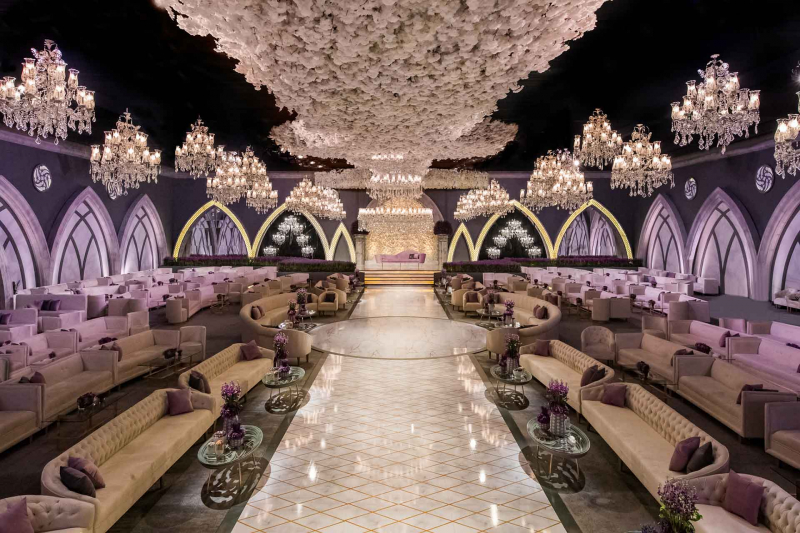
arabiaweddings.com 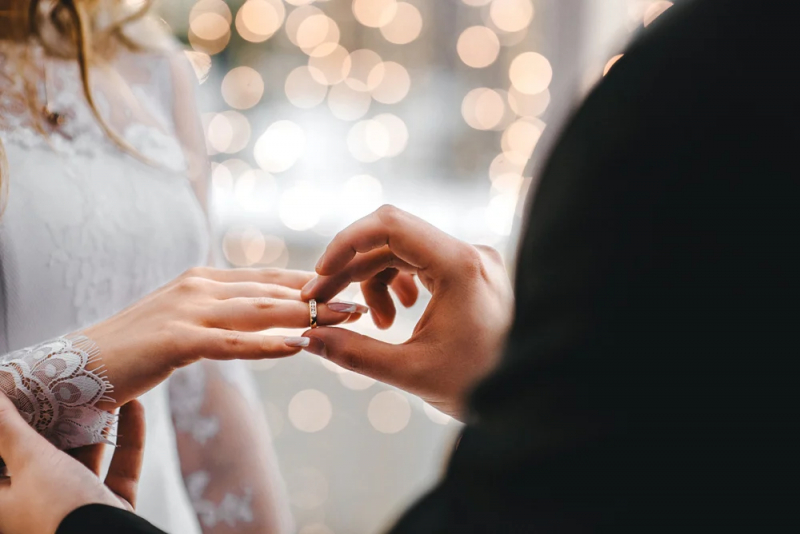
abouther.com -
People doing business in the Kingdom must understand Saudi etiquette as well as their personal demeanor. Preparation and a basic understanding of Saudi business culture can mean the difference between a successful and unsuccessful negotiation.
Some Saudi business executives and government officials may be hesitant to schedule meetings until their visitors arrive in the Kingdom. Visitors on business should notify their Saudi hosts of their travel plans and itinerary. Religious holidays such as Ramadan and Hajj, as well as daily prayer breaks, should be taken into account when scheduling business meetings.
Without such a face-to-face meeting, Saudi businesses are unlikely to finalize any serious negotiations, as doing business in the Kingdom is still mostly personal. As a sign of respect for the person with whom you are meeting, proper attire is required for business meetings. Conservative business attire is advised. Business cards are usually printed on one side in English and the other in Arabic. Meetings are conducted at a leisurely pace, with participants engaging in friendly conversation over coffee and tea.
Before signing any agreements or contracts, Saudi business executives prefer to feel at ease with their business partners. This may entail a series of preliminary meetings during which no substantive business is discussed. These gatherings, however, can be just as important as serious business negotiations. Because such business appointments are frequently lengthy, adequate time should be set aside for them.

proven-sa.com 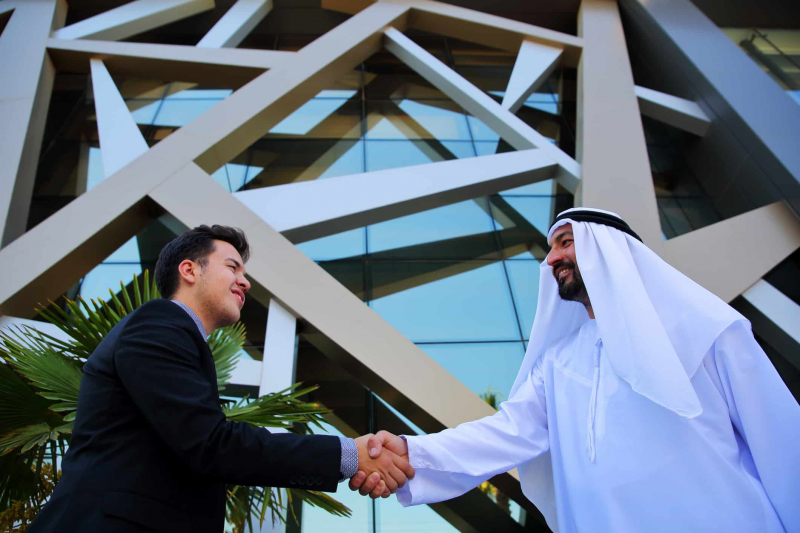
tgmresearch.com -
The family was the most important social institution in Saudi Arabia. The family was the primary source of identity and status for most Saudis. Families formed alliances with other families who shared common interests and lifestyles, and individuals tended to socialize within the circle of these family alliances. A family business was typically open to participation by sons, uncles, and male cousins, and served as a social welfare safety net for all members of the extended family.
Families in Saudi Arabia, like families throughout the Middle East, were patriarchal, with the father serving as an authoritarian figure at the top of an age and gender hierarchy. Although relationships with maternal relatives were important, the family identity was tied to the father, and children were thought to belong to him rather than the mother. A family could thus be defined as a man, his children, and his children's children through patrilineal descent at its most limited.
The patriarchal family was supported by cultural and religious values that pervaded society as a whole and were most visible in tribal values and practices. Families shared a sense of corporate identity, and the individual's ability to live up to socially prescribed ideals of honor was used to measure family esteem.
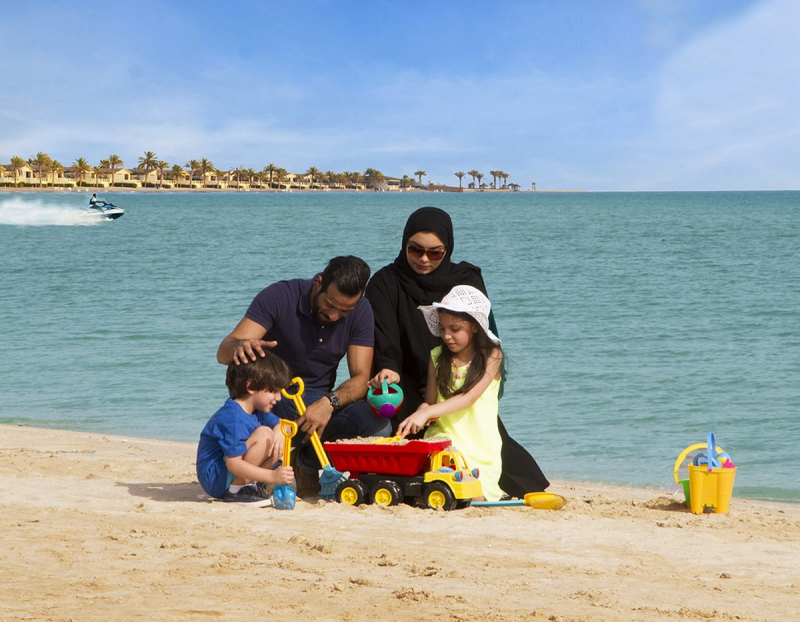
istockphoto.com 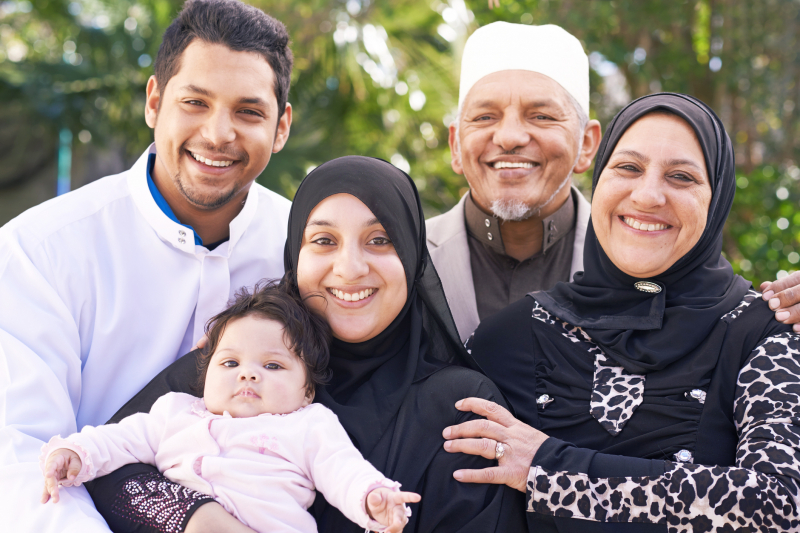
family.lovetoknow.com -
Saudi Arabia's official religion is Islam, and the Quran serves as the country's constitution. The legal system is based on an official interpretation of Islam based on the Sunni jurisprudence of the Hanabali school. Saudi Arabia has a population of about 27 million people, with 80 to 90 percent of the population following Sunni traditions. Shia make up about 10% to 15% of the population. There is almost no religious freedom, and any religion other than Islam is prohibited.
Muslims who did not accept the government's interpretation of Islam were subjected to political, economic, legal, and religious persecution. Individuals have been arrested for insulting Islam. Saudi Arabia values its responsibility as guardian of the two Holy Mosques in Mecca and Medina. Other than mosques, the construction of religious structures is prohibited. The Saudi government is financially responsible for all Sunni mosques in the country, which number over 60,000 in total.
Children born to Muslim fathers are automatically Muslim, and leaving Islam is punishable by death. The death penalty is also applied to blasphemy against Islam. Non-Muslims must convert to Islam in order to become naturalized.
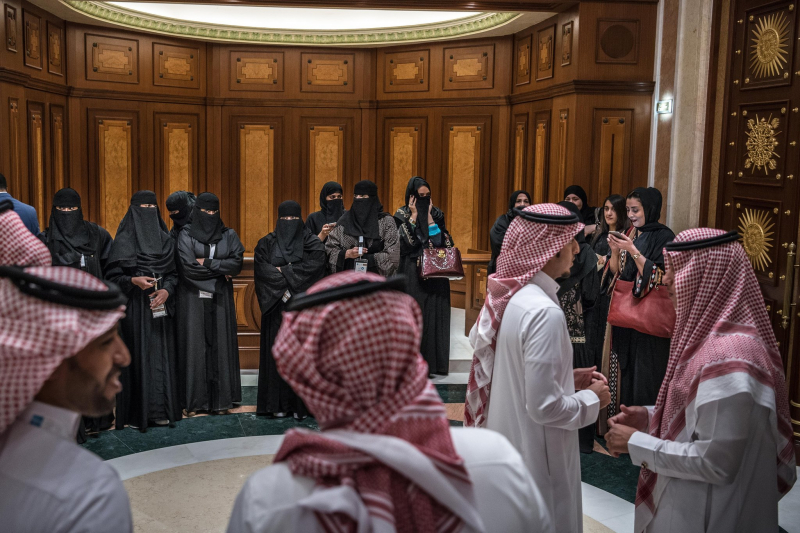
reuters.com 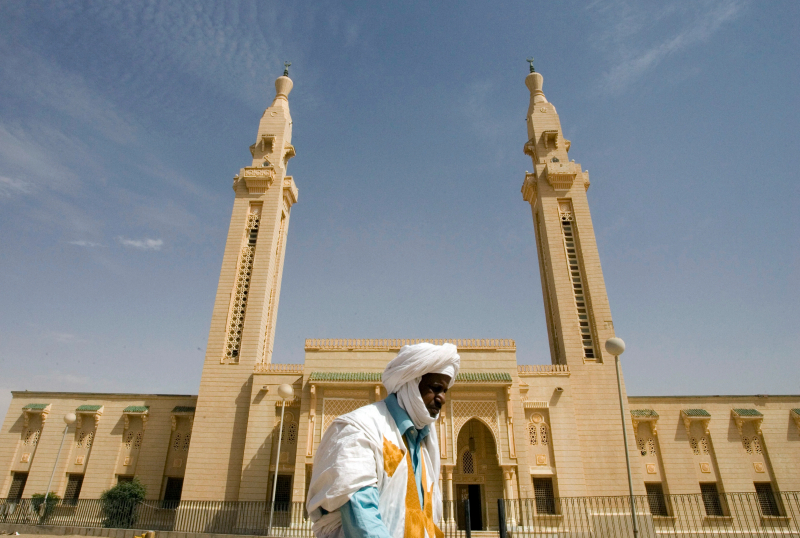
brookings.com -
Names in Saudi Arabia reveal a lot about a person's ancestry and follow the lineage of names passed down from the male side of their family. The children will be named after their fathers, grandfathers, and so on. Saudi women, on the other hand, do not traditionally take their husbands' names when they marry.
The majority of Saudis use Arabic naming conventions. This should be formatted as: [personal name] [Father's given name] [Grandfather's given name] [NAME OF FAMILY/TRIBAL]. For instance, Ahmad Hussain Khan AL-SAUD (male) and Noura Hussain Khan AL-SAUD (female).
On occasion, people will add a fourth name from their father's side of the family, which is the name of their great grandfather: [personal name]. [Father's given name] [Grandfather's given name] [Name of great grandfather]. There are several ways to transliterate Arabic names into English. The same name, for example, can be written as "Majid," "Majeed," or "Mejeed." The spelling can also vary depending on whether or not contractions are used. "Saladdin," for example, could also be spelled "Sal-ad-Din" or "Sal-Addin."
Male names that are commonly used include Abdullah, Muhammad, Ahmad, Ibrahim, Ali, and Saad. Fatemah, Maryam, Nura, Layla, Ayasha, Sarah, and Maha are some popular female names. Be aware that many Saudi men may be hesitant to tell unrelated friends the names of their female family members.
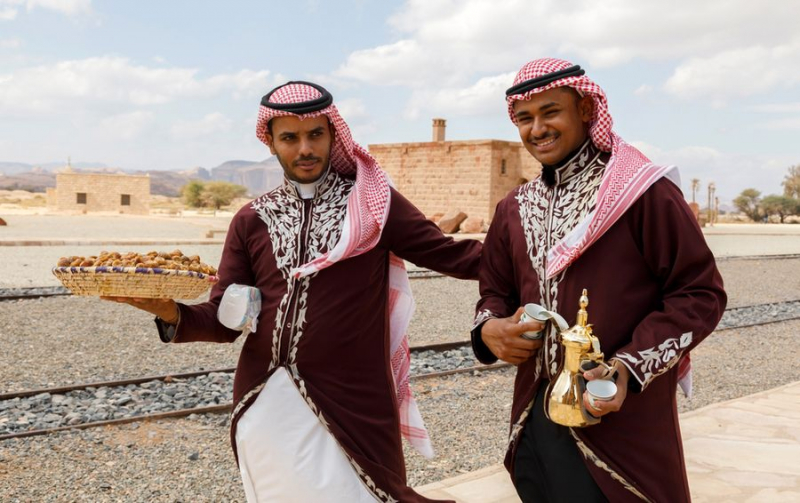
zamzam.com 
news.un.org































